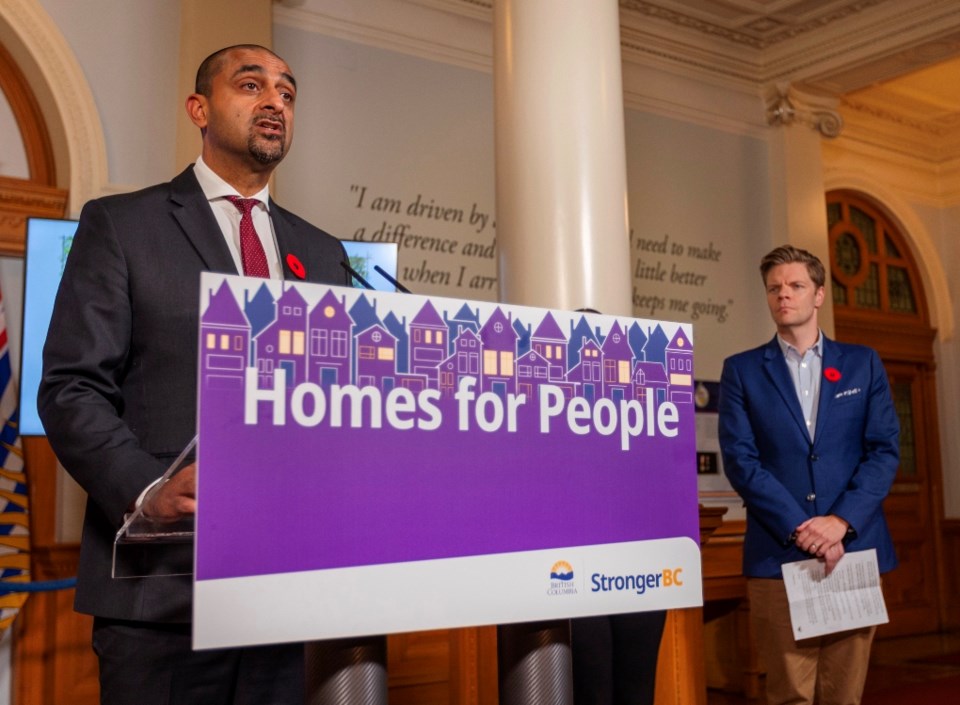Single-family zoning isn’t the only thing abolished in the NDP government’s bill that mandates up to six dwellings on each such lot.
The bill also eliminates the need for public hearings except in specific instances. It not only removes the need, it specifically outlaws them.
“A local government must not hold a public hearing …” crops up three times in this week’s Bill 44, Housing Statutes (Residential Development) Amendment Act.
Instead of advertising public hearings, the bill requires councils to advertise that they will not be holding them.
It’s not what you’d expect from a party with the word “democratic” in its name. This is a government that has a communication and public engagement department devoted to listening to and polling people on dozens of issues.
They just finished a consultation to help decide what the official provincial fossil should be.
But now they are imposing strict new limits on people’s ability to express views on vastly more important issues to do with what their neighbourhoods look like.
The move builds on antipathy to the public hearing process that has been building for a few years. It arises from the entrenched NIMBY-ism that fuels strident opposition to development changes. That turns hearings into midnight marathons during which councillors give up in exhaustion and say no to projects that deserve yes.
The criticism arose in earlier housing reports the government received.
“Anti-development interests apply disproportionate political pressure on decision-makers,” said a 2021 report co-chaired by New Democrat Joy MacPhail.
The main problem is the one-sidedness. The people who stand to benefit aren’t there to support, obviously because the projects aren’t built yet.
So if a project fits the community plan and the development is at least half residential, no hearings will be needed.
Another section that could loom large eliminates parking requirements.
Starting next July, “the council of a municipality must not require an owner or operator … to provide off-street parking or loading spaces for residential use ….”
That continues the trend to relax such demands.
The bill overrides single-family zoning to allow one secondary suite or laneway home in every community. In every community over 5,000 population it requires local bylaws to allow up to four units, and up to six if the lot is big enough and near rapid transit or bus stops. Size, setback and other details have not been published.
Municipalities can go even bigger, but not smaller.
The bill is designed to spark a huge increase in housing starts that could create 130,000 new small-scale multi-unit homes over a decade. Municipalities will have to submit long-term housing need assessments, and if the pace of new starts doesn’t match the need, the province will force more and faster approvals.
The effect is to pre-zone most of urban sa国际传媒 for a multi-unit surge 20 years into the future.
Housing Minister Ravi Kahlon said a surge in lot prices is not expected, because the change affects such a large area. Based on examples elsewhere, he said the price hike “is actually very small compared to … one property being rezoned.”
Whatever arguments arise, there’s not much doubt who holds the upper hand.
The phrase “a local government must …” appears a dozen times in the bill.
Just So You Know: A reader was labouring through BC Hydro’s latest polling survey when she got to a question that made her pause.
After a barrage of queries about electricity use and bill payment preferences, the utility wanted to know if she is gay.
For people who picture a BC Hydro full of engineers and bean counters who build dams and deal with boring things like kilowatt hours, it’s a bit startling.
“Do you identify as a member of the LGBTQS2+ community?”
The choices offered were: “Yes, no, prefer not to say.”
Its part of a “gender based analysis plus” approach that many governments across sa国际传媒 have adopted in the past few years.
A BC Hydro official said they are exploring additional rate options and the analysis is a tool that goes beyond the standard demographic breakdowns to assess how diverse groups of people might experience policies and initiatives.
So the answers give the utility a better breakdown of how different people feel about issues.
There’s no option to respond: “It depends on which answer gets me the cheapest rate.”



